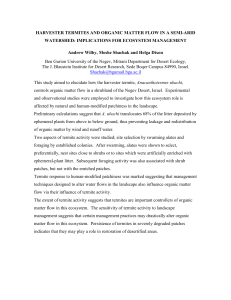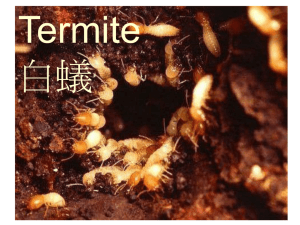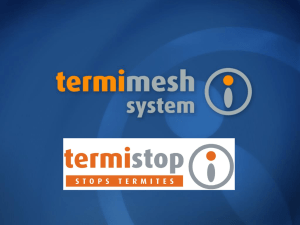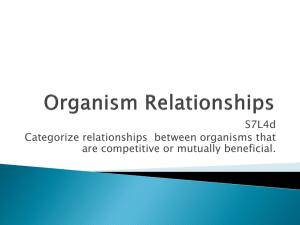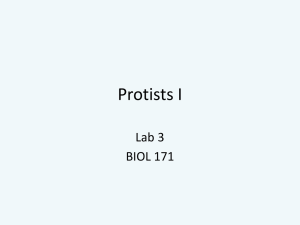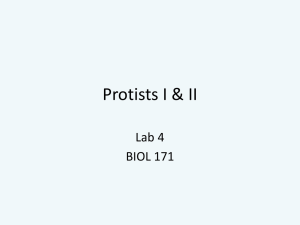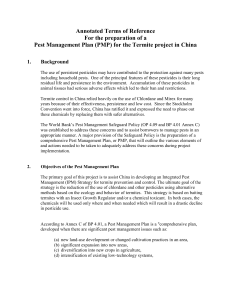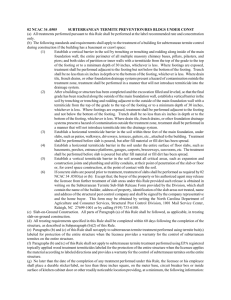Terms of Reference
advertisement
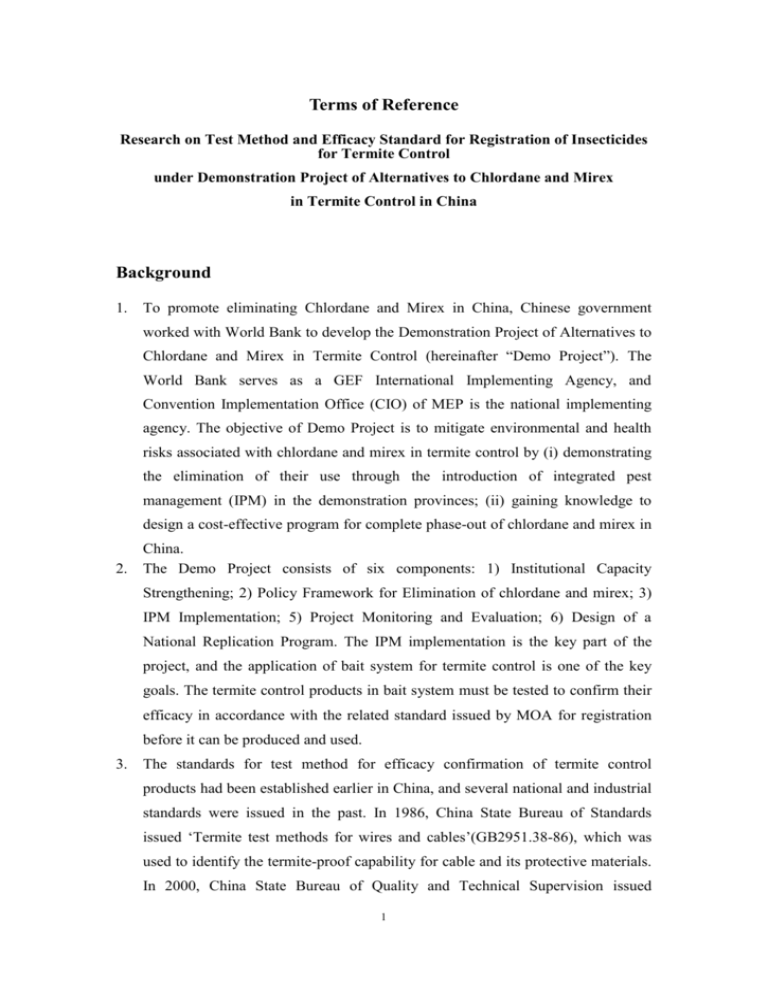
Terms of Reference Research on Test Method and Efficacy Standard for Registration of Insecticides for Termite Control under Demonstration Project of Alternatives to Chlordane and Mirex in Termite Control in China Background 1. To promote eliminating Chlordane and Mirex in China, Chinese government worked with World Bank to develop the Demonstration Project of Alternatives to Chlordane and Mirex in Termite Control (hereinafter “Demo Project”). The World Bank serves as a GEF International Implementing Agency, and Convention Implementation Office (CIO) of MEP is the national implementing agency. The objective of Demo Project is to mitigate environmental and health risks associated with chlordane and mirex in termite control by (i) demonstrating the elimination of their use through the introduction of integrated pest management (IPM) in the demonstration provinces; (ii) gaining knowledge to design a cost-effective program for complete phase-out of chlordane and mirex in China. 2. The Demo Project consists of six components: 1) Institutional Capacity Strengthening; 2) Policy Framework for Elimination of chlordane and mirex; 3) IPM Implementation; 5) Project Monitoring and Evaluation; 6) Design of a National Replication Program. The IPM implementation is the key part of the project, and the application of bait system for termite control is one of the key goals. The termite control products in bait system must be tested to confirm their efficacy in accordance with the related standard issued by MOA for registration before it can be produced and used. 3. The standards for test method for efficacy confirmation of termite control products had been established earlier in China, and several national and industrial standards were issued in the past. In 1986, China State Bureau of Standards issued ‘Termite test methods for wires and cables’(GB2951.38-86), which was used to identify the termite-proof capability for cable and its protective materials. In 2000, China State Bureau of Quality and Technical Supervision issued 1 ‘Laboratory test method for wood preservatives of determining the protective effectiveness of preservatives against termites’ (GB/T18260-2000), which was used to determine the protective effectiveness of preserved wood against Coptotermes formosanus. In 2003, MOA issued ‘Laboratory efficacy criterions of public health insecticides for pesticide registration’. 4. Through years of revision, in 2006 MOA issued ‘Test methods and efficacy determination of insecticides for termite control for pesticide registration’ (NY/T 1153.1-2006 ~ 1153.6-2006) to regulate the test methods and efficacy determination for insecticides used for termite control, and to provide reference for pesticide registration management in termite control industry. However, there have been advancement in termite control approaches with diverse products on the market and the control techniques have been greatly improved. Due to these recent developments, some of test methods for efficacy evaluation have temporary lagged behind the current termite control techniques. Moreover, in comparison with some developed countries such as USA and Australia, current standard lacks some scientific consistency and accuracy. Therefore, it is necessary to revise the original standard to ensure new products and new techniques are properly evaluated and registered, which will promote the application of IPM in Demostration Project and ensure the complete development for termite control industry in China. Objective 5. Review of current evaluation standard for registration of termite control insecticides so as to provide suggestions for modification of current standard, or to provide as reference to draft new methods for pesticide registration. To promote reduction and elimination of mirex and chlordane, and to extend the application of IPM in China by establishing efficacy evaluation protocols pertinent to current termite control practices in China Scope of work 6. Data collection and investigation 2 a. To gather related test methods and evaluation standards for termite control products through literature review, written survey, telephone survey and workshops. b. By the way of written form for revision comments from government sections, professional institutions and experts, regarding the existing test methods and efficacy determination for termite control insecticides. c. Organize specific workshops to discuss the revision and updating for related standard for termite control. 7. Evaluation and research Analyze and evaluate the weakness of current test method and efficacy evaluation based on the collected data and survey result, integrated, and provide revision suggestions according to termite control status and development trend. 8. Draft the revised standard a. General outline for the new standard. b. Draft test method and efficacy evaluation protocol for registration of insecticide for termite control. The final work will be completed with expert inputs. 9. Validation test. The termicide Registration standard will include 6 parts: a. Efficacy of technical pesticide in controlling termites Pesticide toxicity transmission in termites Pesticide soil treatment for termite control Pesticide treatment of wood for termite control Bait treatment for termite control Pesticide residual spray for termite control in and around buildings The validation test will be done for all six parts.Organize test for new technique and standard b. Organize experts and technical staff in specific testing site to conduct validation test for new standard, and launch practical validation and evaluation regarding the test methods and indicators mentioned in new standard. 3 Qualification of the consulting firm 10. One consulting firm will be selected through the standard World Bank’s procurement method. The selected firm is required to understand in depth the situation of termite control sectors in China and has proven capacity and experience to organize and undertaken this assignment. The following qualifications should be included: i. Proven ability to conduct scientific research in field experimental biology ii. Demonstrate the knowledge and understanding of population ecology of subterranean termites, especially the dam- and dike-infesting termite species such as O. formosanus iii. Proven ability to produce peer-reviewed scientific articles iv. Knowledge and understanding of the termite control practice, especially in the area of monitoring-baiting technology is preferable 11. The assignment will need at least 5 person, one team leader, two technical staff, and two operators. Also the consultant firm should invite experts from related field for consultation and review of the output reports. 12. The following qualifications will be helpful: v. Knowledge and understanding of subterranean termite IPM, especially in the context of the Stockholm Convention on POPs vi. Execution of the similar service vii. Fluent speaking and writing in English Output 13. The outputs of this assignment include: a. Detailed work plan b. Evaluation report on ‘Test methods and efficacy evaluation for registration of insecticides for termite control’ c. Revision and direction on ‘Test methods and efficacy evaluation for registration of insecticides for termite control’ 4 Schedule 14. The duration of the assignment will be 10 months after the contract enters into effectiveness. Activity Work plan Collection of existing test methods and appraisal standard on termite control products Summarize overall revised advices and comments on existing standard revision Draft evaluation report on existing standard Organize workshop to discussing the evaluation report on current standard Organize validation test 1 according to the revised evaluation report Complete the validation test report workshop for discussing the validation report and the revised standard 2010 12 1 2 3 4 2011 5 6 7 8 X X X X X X X X X X X X X Complete final report 1 9 Only indoor test can be implemented in winter time because of the termite behavior, the outdoor test must be put to worm time after May, the detail time will confirmed according by the location of the test site. 5 X X
